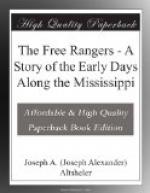“When he comes close enough, if he can do so before the horse takes the alarm,” said Henry, “he will throw the rope and catch the horse by the neck in the running noose at the end.”
“But the horse will take alarm,” said Paul hopefully.
“I don’t know,” said Henry. “He may think in his horse mind that one enemy in one day is as much as he has need to dread.”
It seemed that Henry was right. Exultant in his victory over the cougar, the Prairie King had relaxed his vigilance. More often now his head was down, cropping the grass like the rest of the herd. Henry and Paul believed that they could see the grass rippling as the new and more cunning enemy crept forward. But it was only agile fancy—they were too far away.
“What ever happens it’s bound to happen soon,” said Henry.
Even as he spoke the man in the grass sprang to his feet, threw forth his right arm, and the rope shot out like a snake uncoiling itself as it sprang. Both Paul and Henry felt a pang when they saw the loop enclose the neck of the noble horse, while the man himself and his comrades uttered loud shouts of exultation.
“He has caught him!” exclaimed Paul sadly.
“Yes,” said Henry, “and I’m sorry, but it was a wonderful feat of skill and patience!”
The frightened herd ran away, and the white stallion reared and struggled, his great eyes red and distended with rage and astonishment. Two men ran forward and seized the rope which their comrade had thrown so skillfully. Then the three pulled hard.
But the quarry was too magnificent. They had miscalculated the white stallion’s strength. Caught by the neck, he dragged, nevertheless, all three over the prairie, and then, suddenly making a mighty lunge, tore the rope from their grasp, leaving them thrown headlong to the earth. Away he went, the long rope flying out behind him like a streamer.
Doubtless some failure of the noose to draw tightly around his neck had saved the horse, and this was proved when the rope catching in a bush slipped off over his head as he struggled again. Then the stallion, by chance, or because his horse’s mind inclined him to it, uttered a long, shrill neigh of triumph, kicked his heels high in the air, and galloped away, his flowing tail streaming out behind him, a banner of triumph.
“He’s won again,” said Henry in a tone of gladness. “I told you that horse wasn’t made ever to be ridden.”
“But he has to struggle continually for life and freedom,” said Paul.
“Just the same as we do,” rejoined Henry. “See those fellows are picking themselves up; but they’ve been slow about it.”
“I don’t blame them. I fancy they suffered some pretty severe bruises when the horse jerked them down. Paul, I think I can make out two white faces in that party, which almost certainly means that they are the men of Alvarez. And it says to us that we ought to hurry.”




